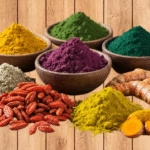Introduction to Superfoods
Superfoods are nutrient-dense foods that are recognized for their exceptional health benefits and contributions to overall wellness. These foods are typically rich in vitamins, minerals, antioxidants, and other bioactive compounds. They provide significant advantages in supporting physical and mental health. Superfoods play a critical role in a balanced diet, often enhancing the nutritional profile of meals without adding excessive calories. These superfoods are nutritional powerhouses, especially valuable today as more people prioritize healthy eating. Their dense nutrients support wellness in our increasingly health-conscious world.
The term “superfood” encompasses a variety of plant-based proteins. Fruits, vegetables, nuts, and seeds are considered to promote health due to their high concentrations of beneficial compounds. For example, antioxidant-rich foods, such as berries and dark leafy greens, can combat oxidative stress in the body. Anti-inflammatory foods like turmeric and fatty fish support heart health and cognitive function. Healthy fats, like those in avocados and walnuts, are considered superfoods because they reduce inflammation. They also support brain health, making them a key part of a nutritious diet.

Incorporating energy-boosting superfoods into daily eating habits can lead to improved physical performance and increased vitality. By prioritizing these foods in one’s diet, individuals can improve their overall well-being. Moreover, superfoods often surpass conventional foods in their health impacts. Eating nutrient-dense superfoods regularly delivers essential nutrients while helping protect against chronic diseases. These powerful foods also support overall health and may even promote longevity. Thus, embracing superfoods as part of a daily regimen can serve as an empowering choice for individuals seeking to elevate their health and nourish their body from within.
The Nutritional Powerhouses: Top Superfoods
Superfoods are often hailed as nutrient-dense superfoods that can significantly impact overall health. Among the most recognized are blueberries, quinoa, kale, chia seeds, and spinach, each packed with vital nutrients and health benefits.
Blueberries are antioxidant-rich foods that provide essential vitamins and minerals, specifically vitamin C and K, as well as dietary fiber. Their high antioxidant content helps combat oxidative stress in the body, potentially reducing the risk of chronic diseases such as heart disease and diabetes. Incorporating blueberries into one’s diet not only supports immunity but also contributes to cognitive function, enhancing memory and brain health.
Quinoa, a versatile grain, is celebrated as a source of plant-based proteins and is considered a complete protein since it contains all nine essential amino acids. This makes it particularly beneficial for vegetarians and vegans. Additionally, quinoa is rich in magnesium, a mineral crucial for energy production and muscle function, thus promoting overall vitality and well-being.
Kale is often referred to as a superfood due to its high concentration of vitamins A, C, and K, as well as powerful antioxidants. Regular consumption of kale has been linked to improved heart health, thanks to its ability to lower cholesterol levels. This leafy green also acts as an anti-inflammatory food that may help in reducing chronic inflammation in the body.
Chia seeds are tiny but mighty, providing a wealth of healthy fats for brain function and packed with omega-3 fatty acids. They are also a great source of dietary fiber, which aids in digestion and can contribute to weight management. The combination of proteins and healthy fats in chia seeds makes them a perfect addition to smoothies, yogurt, or salads.

Finally, spinach offers an excellent assortment of vitamins, minerals, and phytonutrients, making it one of the best antioxidant-rich foods available.
Berries: Nature’s Sweet Superfoods
Berries, including blueberries, strawberries, and acai berries, are often regarded as nature’s sweet superfoods due to their impressive array of health benefits. Rich in vitamins, minerals, and particularly known for their antioxidant properties, berries play a significant role in promoting overall well-being. These nutrient-dense superfoods are packed with antioxidants such as flavonoids, which help combat oxidative stress in the body. This makes them essential for reducing the risk of chronic diseases and enhancing heart health.
Blueberries, for example, have been extensively studied for their potential to improve cognitive function and support memory. They are also known to exhibit anti-inflammatory properties, making them an excellent choice for combating conditions related to inflammation. Strawberries, similarly, are not only delicious but are also high in vitamin C, which contributes to skin health by promoting collagen production and protecting against UV damage. Acai berries stand out due to their high levels of anthocyanins, a type of antioxidant that can help improve blood circulation and support cardiovascular health.
Integrating these berries into your diet is both easy and enjoyable. They can be blended into smoothies, added to oatmeal or yogurt, or used as toppings for salads. Additionally, consider incorporating berries into baked goods, such as muffins or pancakes, for a wholesome snack or breakfast option. For those seeking energy-boosting superfoods, creating a berry-infused chia pudding can serve as a nutrient-rich breakfast or an energy-boosting snack throughout the day. The versatility and flavor of these fruits make them a delightful addition to both sweet and savory dishes.
By embracing berries as part of a balanced diet, individuals can harness the numerous health benefits these antioxidant-rich foods offer while enjoying their natural sweetness. In conclusion, the incorporation of berries into your daily meals not only provides essential nutrients but also heightens the enjoyment of healthy eating.
Leafy Greens: Essential for Vitality
Leafy greens, including spinach, kale, and Swiss chard, are often heralded as some of the most vital nutrient-dense superfoods available. These greens are not only low in calories but also brimming with essential vitamins and minerals that play a crucial role in maintaining overall health. For instance, spinach is rich in vitamin A, which is essential for vision and immune function. Kale provides an excellent source of vitamin C, known for its antioxidant properties, while Swiss chard is packed with vitamin K, a critical factor in bone health and blood clotting.
Moreover, leafy greens are an excellent source of plant-based proteins and healthy fats for brain function. These superfoods also facilitate digestion, thanks to their high fiber content, which can aid in preventing constipation and promoting gut health. Such nutrient-rich foods are particularly beneficial for individuals looking to enhance their energy levels; they operate as energy-boosting superfoods that support sustained physical activity and mental clarity throughout the day.
Additionally, the minerals found in leafy greens, including iron and calcium, are essential for promoting heart health and maintaining robust energy levels. Iron is vital for forming hemoglobin, which transports oxygen in the body, while calcium is crucial not just for bones but also for muscle function. Incorporating these greens into your diet can lead to a healthy and balanced intake of antioxidant-rich foods and anti-inflammatory foods, further enhancing your overall wellness.
Incorporating a variety of leafy greens into meals is an effortless way to ensure a comprehensive nutrient profile. Whether enjoyed in salads, smoothies, or cooked dishes, these vibrant vegetables serve as a foundation for a healthy diet, assisting in various bodily functions and promoting vitality.
Seeds and Nuts: Tiny But Mighty
Seeds and nuts are often underestimated despite being some of the most nutrient-dense superfoods available. Among these, chia seeds, flaxseeds, walnuts, and almonds stand out for their remarkable health benefits. These tiny powerhouses pack a wealth of plant-based proteins, healthy fats, and essential nutrients, making them excellent additions to any diet.
Chia seeds, for instance, are rich in omega-3 fatty acids, which are vital for brain health. These energy-boosting superfoods also contain high levels of fiber, which aids in digestion and helps maintain steady energy levels throughout the day. Similarly, flaxseeds offer numerous health benefits due to their high content of lignans and omega-3s, contributing to heart health and reducing inflammation.
Walnuts are another exceptional choice, as they are known for their antioxidant-rich properties. They provide significant amounts of healthy fats and proteins, making them a perfect snack or an addition to salads and baked goods. Incorporating walnuts into your diet may also have positive effects on cognitive function, further solidifying their status as brain-healthy superfoods.
Almonds, too, should not be overlooked. Rich in vitamin E and magnesium, almonds are excellent for heart health and can help lower cholesterol levels. They serve as a versatile ingredient, working well in everything from smoothies to granola bars, providing both flavor and nutritional benefits.
To incorporate these nutrient-dense superfoods into your meals, consider adding chia or flaxseeds to your morning oatmeal or yogurt, tossing walnuts into salads, or enjoying almonds as a quick snack. By integrating these seeds and nuts into your diet, you not only enhance the nutritional profile of your meals but also support overall health and well-being.
Whole Grains: Fiber-Rich Superfoods
Whole grains are a category of superfoods renowned for their high fiber content and numerous health benefits. Nutrient-dense superfoods like quinoa, brown rice, and farro are excellent sources of dietary fiber, which plays a vital role in maintaining digestive health and supporting heart health. Incorporating these whole grains into your diet can significantly enhance overall well-being, as they are rich in essential nutrients while also being low in calories.
Quinoa, often referred to as a superfood, is not only a complete protein source but also packed with fiber, which aids in digestion and helps regulate blood sugar levels. Brown rice serves as an excellent alternative to refined grains, delivering both fiber and various vitamins and minerals that contribute to heart health. It is a versatile grain that can be easily added to a variety of dishes—from stir-fries to salads. Farro, an ancient grain, is another fiber-rich option that provides nutritious benefits along with a nutty flavor. It can be used as a base for grain bowls or included in soups, enhancing both taste and texture.
Furthermore, incorporating these energy-boosting superfoods into meals is simple and enjoyable. One can add cooked quinoa or farro to salads for a nutritious boost, or use brown rice as a side dish paired with vegetables and lean proteins. For breakfast, consider utilizing whole grain oats, another type of superfood, to create a hearty porridge topped with fruits and nuts. These diverse options not only promote digestive health and heart health but also introduce healthy fats for brain function and essential nutrients into one’s diet.
In conclusion, integrating whole grains such as quinoa, brown rice, and farro into your meals is an effective strategy for improving health through fiber-rich superfoods. These foods contribute to better digestion and support cardiovascular health.
Legumes: Protein Powerhouses
Legumes, including lentils, chickpeas, and black beans, stand out as some of the most essential superfoods available today. These nutrient-dense superfoods are particularly recognized for their high protein content, providing a valuable source of plant-based proteins that cater to the dietary needs of various individuals. In addition to being rich in protein, legumes are also packed with dietary fiber, which is crucial for maintaining digestive health and managing weight effectively.
The low glycemic index of legumes makes these energy-boosting superfoods an ideal choice for those concerned about blood sugar levels. By integrating legumes into your diet, you can help stabilize blood glucose and reduce the risk of type 2 diabetes. Furthermore, their fiber content aids in promoting satiety, which may support weight management efforts by curbing overeating.
Incorporating legumes into your meals can be both convenient and delightful. For instance, lentils are versatile and can be used in soups, stews, or salads. A simple recipe could involve simmering lentils with diced tomatoes, onions, and garlic for a hearty dish rich in antioxidants and anti-inflammatory properties. Chickpeas are equally versatile; they can be roasted for a crunchy snack or blended into hummus, providing a delicious way to enjoy their benefits. Black beans can be easily added to tacos or salad bowls, offering healthy fats for brain function together with their impressive protein and fiber profile.
By emphasizing legumes in your daily meals, you can not only improve your nutrition but also enjoy a variety of flavors and textures. The incorporation of these superfoods can pave the way for enhanced overall health, promoting heart health and well-being through their rich nutrient offerings. In conclusion, legumes’ combination of protein, fiber, and essential nutrients makes them an excellent choice for anyone looking to enhance their diet with wholesome, health-promoting foods.
Fermented Foods: Boosting Gut Health
Fermented superfoods have garnered significant attention in recent years due to their profound impact on gut health. These nutrient-dense foods, including yogurt, kefir, kimchi, and sauerkraut, are rich in probiotics—beneficial bacteria that play a critical role in maintaining digestive health. Probiotics contribute to the balance of the gut microbiome, which is essential for proper digestion and nutrient absorption. A well-functioning gut microbiome can also bolster the immune system, helping the body fend off illness and infections more effectively.
Yogurt and kefir, often favored for their creamy textures, are excellent sources of plant-based proteins and healthy fats for brain health. Additionally, the fermentation process that these foods undergo enhances their digestibility and increases the bioavailability of nutrients. Kimchi and sauerkraut, on the other hand, are not only low in calories but also rich in antioxidants, which can help combat oxidative stress and inflammation in the body. The inclusion of these fermented foods in your diet not only supports gut health but may also provide anti-inflammatory benefits that contribute to overall well-being.
Incorporating fermented foods into your daily diet can be both enjoyable and beneficial. For instance, you can add yogurt or kefir to smoothies, blend them with fruits to create a delicious parfait, or utilize them as a base for salad dressings. Kimchi can serve as a flavorful side dish or incorporated into various recipes like stir-fries and tacos, while sauerkraut can enrich sandwiches or salads. By integrating these energy-boosting superfoods into your meals, you can enhance your gut microbiome and, consequently, your overall health. The synergy of probiotics, healthy fats, and vitamins found in these foods promotes not only digestive wellness but also contributes to heart health and improved energy levels.
Conclusion: Embracing Superfoods for Healthier Living
Incorporating superfoods into your daily diet can significantly enhance your overall health and well-being. These nutrient-dense superfoods offer a multitude of benefits, ranging from improved energy levels to better heart health. By including these energy-boosting superfoods, you can expect to experience a more vibrant lifestyle, as they are rich in essential vitamins, minerals, and antioxidants essential for maintaining optimal health.
As discussed throughout the blog, the inclusion of plant-based proteins, healthy fats for brain function, and antioxidant-rich foods in your meals supports various bodily functions. Additionally, the consumption of anti-inflammatory foods can help combat chronic diseases, contributing to longevity and improved quality of life. Making gradual changes in your eating habits, such as substituting processed snacks with nutrient-dense alternatives like nuts, seeds, or berries will certainly yield positive outcomes.
Meal planning is a practical approach to ensure a balanced diet featuring superfoods. Begin by identifying a few superfood items you enjoy, then explore ways to include them in your meals. For instance, consider incorporating spinach or kale into smoothies, using quinoa as a base for salads, or opting for fatty fish like salmon, which combines healthy fats with protein. Depending on your preferences, you can also try adding chia seeds or flaxseeds to breakfast dishes for an extra nutrient boost.
Ultimately, embracing superfoods in your diet is not about drastic changes but rather about making informed choices that contribute to your health journey. Start small, and gradually introduce these nutrient powerhouses into your meals. By doing so, you will cultivate a more nourishing eating pattern that leads to healthier living and improved well-being over time.



[…] Understanding Nutrition and Its Impact – What Nutrients Should YOU Prioritize Daily? […]
[…] 2. Fuel Your Body with Nourishing Foods for Optimal Fitness and Wellness: […]
Son zamanlarda deneme bonusu veren siteleri araştırırken bu yazıya denk geldim, gerçekten oldukça faydalı bilgiler içeriyor. Özellikle bahis oynamaya yeni başlayan biri olarak, ilk etapta yatırım yapmadan güvenilir bahis siteleri üzerinden deneme bonusu almak büyük avantaj sağlıyor. Listelenen sitelerin çoğunu denedim ve sorunsuz ödeme yapanları bulmak gerçekten önemli. Böyle içeriklerin devamını bekliyorum, hem zaman kazandırıyor hem de dolandırıcı sitelerden uzak durmamı sağlıyor. 👍
Yorumları dikkatlice okuduktan sonra güvenilir bahis siteleri konusunda detaylı rehberler lazım.
[…] What Makes Moringa So “Magical”? […]
[…] The Role of Nitric Oxide in Athletic Performance […]
[…] Shopping Smart: A Guide to Healthy Ingredients […]